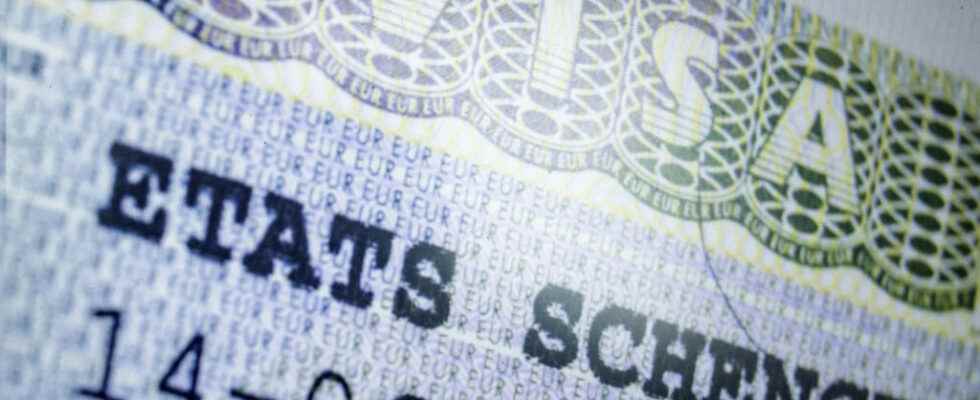This “Question arouses increasingly lively debates in Africa” spear Africa XXI. After an investigation into the business of closed borders, the online newspaper tells how, following this, he was contacted by “private students returning to university or artists invited by major festivals stranded at home”.
See Lamine S. A Guinean “Admitted to a bachelor’s degree in management and business management in Tours, France”. But to come, you need a visa. Two attempts, two failures. To the first, “his father, a Guinean entrepreneur” blocked “10,800 euros to the Société Générale de Banques au Sénégal, the establishment indicates that it undertakes to irrevocably transfer 900 euros per month to Lamine throughout its scalar year”.
Nice try, but it won’t. On the second attempt, “his brother, also an entrepreneur” pays “9,000 euros more into Lamine’s personal bank account”. But nothing helps, it’s still no. For only justification, Lamine receives a single letter from the French consulate in Conakry saying that there was ” serious reasons” to refuse him this visa to establish that you will be staying in France for purposes other than those for which you are applying for a study visa. »
A story of refusal that also rebounds in Côte d’Ivoire
Souleymane, from the Ivory Coast, receives like Lamine a letter of refusal with “the same motive” precise Africa XXI. And yet, on paper, judge for yourself: a graduate engineer from Polytechnique in Yamoussoukro; admitted “in one of the best business schools in France in order to prepare a diploma in energy transition”. Because it is “a profession of the future” testifies the young man. A future barred by Campus France and its “VFS Global Private Provider” in Abidjan. His business school even goes to the French Chancellery. No answer. As a result, Souleymane must repay 20,000 euros in debt after two years of distance learning. All this because of what? Of the “politics of suspicion” which applies, the newspaper recalls, to all Africans, ” speakers or civil society activists ” who “ experience […] the worst difficulties for traveling in France”.
Visas that can also be a weapon between Russia and Europe
In the course of a fascinating report in The world on the militarization of the European border between Poland and Belarus, we learn that the “migrants no longer transit through Minsk in Belarus but through Moscow”. “It is clear that Russia is making it easier for them. The Russian visas are all recent,” assures one of the spokespersons for the border guards of Podlachia, a region bordering the Russian enclave of Kaliningrad. “What is strikinginsists this same Polish official, it is the profile of migrants has changed radically. The vast majority come from sub-Saharan Africa and countries never before identified: Nigeria, Sudan, Congo, Togo, Benin, Madagascar, Ivory Coast, Kenya, Eritrea.. Russia informs us The world, opened the enclave’s airport to international flights in early October. Moscow who “ continue to drive this appalling migration industry” with these migrant hostages of “this hybrid warfare”.
Them, it’s a visa for death that they obtained
Release looks at these “migrant workers from Qatar”more specifically on these “thousands dead”. How many have died on these construction sites of the Football World Cup wonders Released: 6751 deaths according to this figure obtained by the Guardian from London after a reference survey; 6751 deaths of nationals from India, Pakistan, Nepal, Bangladesh and Sri Lanka registered in the consulates of these countries in Qatar. The cause of death is not known, adds the French daily, but “many of the dead workers were employed on World Cup sites”. Because here, since the launch twelve years ago of the titanic works, the Gulf emirate has recruited with a vengeance. We count “700,000 migrants, more than double the number of Qatari citizens, but also 300,000 nationals from Bangladesh, Nepal and the Philippineswrites Hala Kodmani. […]. Workers ready to do anything to work in Qatar, who go into debt” to pay recruitment fees, “and that they will take years to repay” denounces Human Rights Watch. A well-orchestrated trap that crushes men, this is what is described in Release. The kafala, this “system imposed on the employee” […] where “His identity papers are confiscated on his arrival” will finish destroying these men who are candidates for a better life but who have only won a simple visa for death
The ghosts of the stadiums of Qatar, another ghost haunts him the department of Indre…
You may remember Jean-Claude Romand. Twenty-six years spent behind bars for the murder of his wife, children and parents. Today in France followed in the footsteps of the fake WHO doctor immortalized in the opponent, the best-selling book by Emmanuel Carrère. Upon his release, direction the abbey of Fongombault in the Indre, accustomed to hiding those who want to be forgotten. The newspaper states that “in the 1970s, the abbey hid Paul Touvier, the militiaman and war criminal on the run”. For two years, Jean-Claude Romand will respect his electronic surveillance to the letter. And since ? Since then he would live “recluse” in a corner of the Indre. The prosecutor of Châteauroux saying of “ the impostor” : “the right to be forgotten is imposed on him”.
